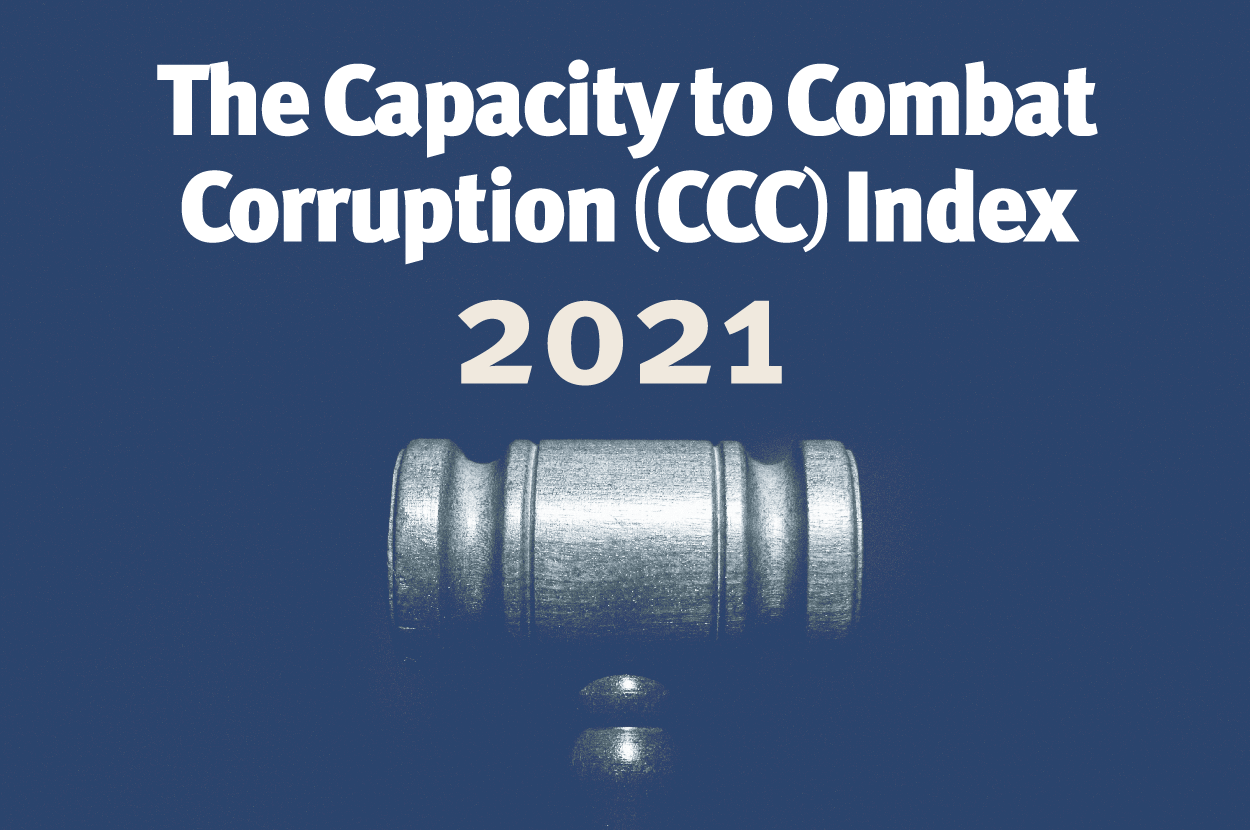Ranking
Scores across the region
Country
Overall Ranking
Scores across the region
Country
Argentina
5
OVERALL
RANKING
Overall Score
5.16
20215.32
20205.33
20194.50 | Legal Capacity |
|---|---|
5.71 | Democracy and Political Institutions |
7.04 | Civil Society and Media |
Although Argentina climbed from sixth to fifth place in the Index’s 2021 ranking, its overall score experienced a slight decline. A perceived increase in politicization of the judiciary and anti-corruption institutions during the administration of President Alberto Fernández contributed to a 7% drop in Argentina’s legal capacity score. An 8% improvement in the civil society and media category, where Argentina outperforms the regional average in all variables, indicates the public’s persistent scrutiny over corruption matters.
Bolivia
14
OVERALL
RANKING
Overall Score
2.43
20212.71
2020N/A
20191.53 | Legal Capacity |
|---|---|
3.99 | Democracy and Political Institutions |
3.54 | Civil Society and Media |
As in 2020, Bolivia scored only above Venezuela in the CCC Index. During a period of rapid political change, the country’s overall score declined by 10%, and its score in the legal capacity category fell by 26%. Bolivia scored at least three points below the regional average on key variables like judicial independence and efficiency, independence of the chief public prosecutor and the independence and efficiency of anti-corruption agencies. These trends underscore actions from the administration of President Luis Arce from the MAS party, who was elected in October 2020.
Brazil
6
OVERALL
RANKING
Overall Score
5.07
20215.52
20206.14
20195.15 | Legal Capacity |
|---|---|
4.16 | Democracy and Political Institutions |
6.34 | Civil Society and Media |
Brazil has been on a downward trajectory in the CCC Index since 2019, and in 2021 it experienced the largest point drop among the 15 countries analyzed. Its overall score fell by 8% from 2020, and Brazil slipped from fourth to sixth place in the overall ranking. Investigations into transnational corruption also lost momentum, and the Lava Jato operation was dismantled in February 2021. Brazil registered an 11% decline in the democracy and political institutions category, where the state of executive-legislative relations was a decisive factor.
Chile
2
OVERALL
RANKING
Overall Score
6.51
20216.57
20206.66
20195.94 | Legal Capacity |
|---|---|
7.49 | Democracy and Political Institutions |
7.24 | Civil Society and Media |
Despite a minor decline in its overall score, Chile maintained its second place standing in the CCC Index. Chile’s capacity to combat corruption remained stable even following the unrest of late 2019 and the political tensions associated with the pandemic throughout 2020. However, social mobilization against corruption dropped by 13%, reflecting pandemic-related lockdowns as well as a shift in focus away from corruption to topics such as inequality, pension reform and the new Constitution.
Colombia
7
OVERALL
RANKING
Overall Score
4.81
20215.18
20205.36
20194.53 | Legal Capacity |
|---|---|
4.70 | Democracy and Political Institutions |
6.18 | Civil Society and Media |
Colombia has been on a multiyear downward trajectory in the Index - its overall score fell by 10% from 2019 to 2021. Emergency spending in the healthcare sector has led to irregularities in public contracting and reports of other corruption. Transparency around these expenditures is perceived as lacking, accounting for a 21% decrease in the variable measuring access to public information. Colombia saw a 12% increase in the civil society and media category, amid ongoing street demonstrations in which corruption is one of the protesters’ many concerns.
Costa Rica
3
OVERALL
RANKING
Overall Score
6.45
20216.43
2020N/A
20196.28 | Legal Capacity |
|---|---|
6.80 | Democracy and Political Institutions |
6.59 | Civil Society and Media |
As in 2020, Costa Rica placed third in the Index behind Uruguay and Chile. While an unaltered overall score is good news in a region plagued by corruption scandals, it is also a sign that anti-corruption efforts are progressing slowly in Costa Rica. Like many countries, Costa Rica has struggled with transparency during the pandemic. Within the legal capacity category, most variables remained stable or saw slight increases except for access to public information, which decreased by 10%.
Dominican Republic
10
OVERALL
RANKING
Overall Score
4.38
20213.26
2020N/A
20194.21 | Legal Capacity |
|---|---|
4.11 | Democracy and Political Institutions |
5.57 | Civil Society and Media |
The Dominican Republic stands out as one of the countries that most improved in the CCC Index, moving from 13th to 10th place overall. That stated, some of the year-on-year gains are also flattered by a relatively low base of comparison from the previous year. The country’s most significant advances were booked in the legal capacity category, which reflects an anti-corruption push from President Luis Abinader, who entered office in August 2020. The peaceful transition of power from the Partido de la Liberación Dominicana (PLD) to the Partido Revolucionario Moderno (PRM) was reflected in the democracy and political institutions category, which increased by 14%.
Ecuador
8
OVERALL
RANKING
Overall Score
4.77
20214.19
2020N/A
20194.78 | Legal Capacity |
|---|---|
4.17 | Democracy and Political Institutions |
5.76 | Civil Society and Media |
Ecuador, whose overall score increased by 14% since 2020, also saw a 16% rise in the legal capacity category. Anti-corruption investigations are ongoing, and the country passed an asset forfeiture law. Ecuador has seen widespread cases of pandemic-related corruption, often involving medical equipment sold at inflated prices. At the same time, civil society mobilization against corruption has increased significantly, and NGOs worked with the government to create a digital platform that tracks public procurement in accordance with the Open Contracting Data Standard.
Guatemala
13
OVERALL
RANKING
Overall Score
3.84
20214.04
20204.55
20193.75 | Legal Capacity |
|---|---|
3.12 | Democracy and Political Institutions |
5.43 | Civil Society and Media |
Guatemala fell from 11th to 13th place in the Index, and its overall score continued on a downward trend, dropping by 5% in 2021, and 16% since 2019. Anti-corruption efforts have diminished since 2019, when the UN-backed International Commission against Impunity in Guatemala (CICIG) was shut down. The country’s civil society mobilization variable saw a 7% setback, but a series of protests did lead to policy changes. In late 2020, Guatemalans protested against the lack of transparency in emergency procurement, forcing the government to shelve a widely criticized budget plan.
Mexico
11
OVERALL
RANKING
Overall Score
4.25
20214.55
20204.65
20193.82 | Legal Capacity |
|---|---|
4.08 | Democracy and Political Institutions |
6.35 | Civil Society and Media |
Mexico is on a clear downward trajectory in the CCC Index - while the decline from 2019 to 2020 was only 2%, its score in 2021 fell by 7%. This drop, along with setbacks in two of the three categories, resulted in Mexico falling from 8th place in 2020 to 11th in 2021. The country fared better in the civil society and media category, where Mexico ranks 5th regionwide. Despite President Andrés Manuel López Obrador’s rhetorical attacks on NGOs, civil society mobilization against corruption remains strong, registering over two points above the regional average, second only to Uruguay.
Panama
9
OVERALL
RANKING
Overall Score
4.55
20214.17
2020N/A
20194.27 | Legal Capacity |
|---|---|
4.91 | Democracy and Political Institutions |
5.11 | Civil Society and Media |
Although Panama remains a global money laundering hub, its performance in the Index reflects improvements in its anti-corruption environment. An increase of 9% in its overall score bumped Panama from 10th to 9th place in the overall ranking, and scores in the legal capacity and democracy and political institutions categories each grew by about 12%. In 2020, Panama passed a law to establish a registry of the beneficial owners of legal entities, and another law creating a public digital platform for government procurement projects came into force.
Paraguay
12
OVERALL
RANKING
Overall Score
4.08
20213.88
2020N/A
20193.69 | Legal Capacity |
|---|---|
3.95 | Democracy and Political Institutions |
5.92 | Civil Society and Media |
Paraguay’s score improved slightly since 2020, but it remains one of the lower-performing countries in the overall ranking. In the democracy and political instructions and legal capacity categories, it ranks third to last. Within the legal capacity category, Paraguay saw its sharpest decline in the access to public information, which dropped by 16%. The perceived lack of transparency regarding emergency spending and the alleged misuse of public resources to fight the pandemic triggered large-scale anti-government demonstrations in March 2021.
Peru
4
OVERALL
RANKING
Overall Score
5.66
20215.47
20205.17
20195.68 | Legal Capacity |
|---|---|
5.21 | Democracy and Political Institutions |
6.34 | Civil Society and Media |
Despite the political turmoil of late 2020, Peru’s score remained stable. The country’s legal capacity score was relatively unchanged, and Peru saw an increase of 12% in the democracy and political institutions category: Peru held internal party primaries for the first time this year, and a campaign finance reform was passed in September 2020. Although former President Martín Vizcarra has been accused of alleged corrupt practices, these advancements in part reflect the results of his anti-corruption drive.
Uruguay
1
OVERALL
RANKING
Overall Score
7.80
20217.78
2020N/A
20197.59 | Legal Capacity |
|---|---|
8.19 | Democracy and Political Institutions |
8.02 | Civil Society and Media |
Uruguay placed first in the CCC Index for the second year in a row, leading all countries in all three categories. Its overall score remained effectively unchanged since 2020, despite the COVID-19 pandemic and a change in government. After 14 years of center-left administrations, center-right President Luis Lacalle Pou took office in March 2020. Despite key improvements in recent years, international watchdogs have highlighted Uruguay’s need for progress in anti-money laundering (AML).
Venezuela
15
OVERALL
RANKING
Overall Score
1.40
20211.52
20201.71
20190.73 | Legal Capacity |
|---|---|
1.14 | Democracy and Political Institutions |
4.72 | Civil Society and Media |
Venezuela remains an outlier in the CCC Index and has ranked last for the third year running. The country’s overall score fell by 8% since 2020, and is over a full point behind Bolivia, the second-worst performer. Venezuela’s score in the democracy and political institutions category plunged by 20%, following a non-competitive legislative election in December 2020. The one category in which Venezuela does not lag behind the rest of region is civil society and media, where it outranks Bolivia.





